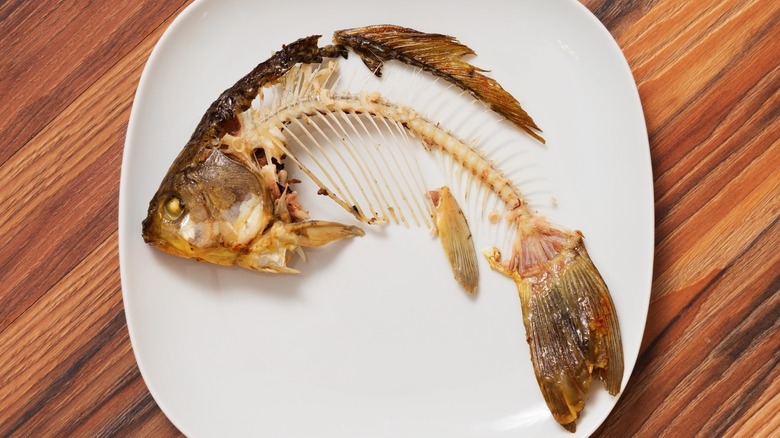What To Do If You Accidentally Swallow A Fish Bone
There's nothing like digging into a show-stopping fish dinner. The butter and seasonings have merged perfectly, the meat is fully cooked and tender — but wait — there's an unexpected texture. If you're eating a fish and wondering what that small, sharp piece you just swallowed is, it's most likely a fish bone. Before panicking, listen to your body and consider the best course of action from there. Swallowing fishbones is a regular mishap when consuming fish, and in most cases, they'll pass without any major issues through your gastrointestinal tract.
The most common issue from ingesting a fish bone is scratching of the mouth and throat. This can sometimes cause minor coughing, bleeding, or discomfort swallowing that will likely clear up within a few days. However, you should consult a medical professional right away if you're experiencing symptoms of drooling, chest pain, continued bleeding, or trouble breathing or eating. A little bit of soreness in the moment might not be a cause for worry, but prolonged pain is definitely worth getting checked out.
Treatment and prevention for swallowing fish bones
If you feel that a fish bone is lodged in your throat that you can't cough or spit out, there are certain foods that might help dislodge it. A spoonful of olive oil can act as a lubricant, and another plus is that it can aid in digestion, possibly clearing the bone out of your system sooner. According to Healthline, foods with a thick, squishy consistency, like bananas, marshmallows, and bread, can also assist in getting fish bones out of your throat and down the path to digestion. One study by Springer Nature suggests that carbonated water can help with swallowing, and carbonated beverages are a common home remedy for fish bone digestion. Avoid eating foods with a lot of salt, spiciness, or acidity, because they can act as throat irritants.
Those with excessive dental problems and dentures have a dulled sensitivity while chewing that makes it harder for them to detect small bones in their food. Take extra care to debone the fish you prepare for seniors, young children, and anyone who may experience difficulties chewing and swallowing, and pay attention if they express any pain during or after eating. If you're worried about bones ending up in your food, plenty of fishmongers will take care of the hassle for you. Whole Foods provides services for making fish prep easier by deboning and chopping your seafood free of charge. While most people are fine if they swallow a bone, some groups are more vulnerable to complications.

